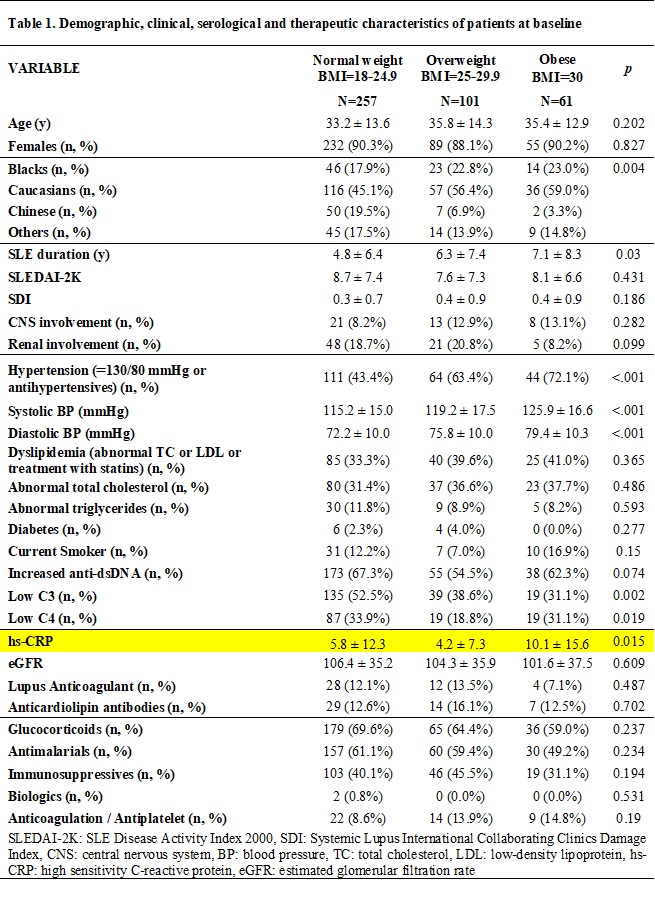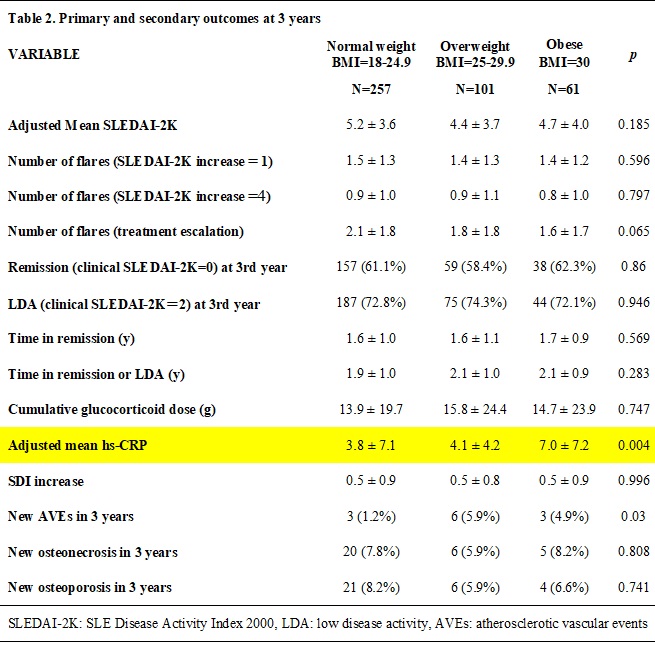Session Information
Date: Sunday, November 7, 2021
Title: SLE – Diagnosis, Manifestations, & Outcomes Poster II: Manifestations (0855–0896)
Session Type: Poster Session B
Session Time: 8:30AM-10:30AM
Background/Purpose: Increased Body Mass Index (BMI) affects cardiovascular risk and is related to worse health-related quality of life measures in patients with systemic lupus erythematosus (SLE). However, its impact on disease activity over time is not known. The aim of the present study was to assess the impact of increased BMI on measures of disease activity in SLE.
Methods: Patients with documented weight and height in their first two clinic visits and at least three consecutive years of follow-up were retrieved from our long-term longitudinal database. They were divided into three groups according to their BMI (normal BMI=18-24.9, overweight with BMI=25-29.9 and obese with BMI ≥30). Patients were followed for three years for outcomes of disease activity (primary) including the time-adjusted mean SLE Disease Activity Index 2000 (AMS), number of flares (defined as any increase in SLEDAI-2K, any increase ≥4 in SLEDAI-2K and systemic treatment escalation), percentage of patients achieving clinical remission and low disease activity state (LDA, defined as clinical SLEDAI-2K 2 regardless of therapy), time spent in remission and/or LDA, cumulative glucocorticoid dose and adjusted high sensitivity C-reactive protein (hs-CRP). Secondary outcomes included new damage accrual (increase in Damage Index) as well as new atherosclerotic vascular events (AVEs), osteoporosis and osteonecrosis. Outcomes were compared among groups by ANOVA test for mean values and Chi-Square test for binary variables; post-hoc multi-testing adjustments were applied in case of statistical difference. The associated effect of obesity on AMS in three years was evaluated using Linear regression analysis.
Results: There were 419 eligible patients (257 with normal BMI, 101 overweight, 61 obese). The baseline characteristics are shown in Table 1. Obese patients had a longer disease duration and higher prevalence of hypertension and higher hs-CRP at baseline. Other variables did not differ significantly between groups. The outcomes after three years of follow-up are shown in Table 2. There were no differences in terms of adjusted mean SLEDAI-2K, flare rate and time spent in remission and/or low disease activity after three years of follow-up between normal weight, overweight and obese patients. However, obese patients had higher time-adjusted hs-CRP. Overweight patients developed more frequently AVEs. Linear regression analysis with AMS as the dependent outcome did not confirm obesity to significantly affect this measure of disease activity.
Conclusion: Obese patients had a higher time-adjusted CRP over three years indicating persistent inflammation. However, this was not associated with increased lupus inflammatory burden. These patients more frequently developed atherosclerotic cardiovascular events that could be explained both by the persistence of inflammation (as expressed by the CRP) and traditional atherosclerotic risk factors.
To cite this abstract in AMA style:
Tselios K, Gladman D, Su J, Urowitz M. Does Obesity Affect Disease Activity Outcomes in Systemic Lupus Erythematosus? [abstract]. Arthritis Rheumatol. 2021; 73 (suppl 9). https://acrabstracts.org/abstract/does-obesity-affect-disease-activity-outcomes-in-systemic-lupus-erythematosus/. Accessed .« Back to ACR Convergence 2021
ACR Meeting Abstracts - https://acrabstracts.org/abstract/does-obesity-affect-disease-activity-outcomes-in-systemic-lupus-erythematosus/


